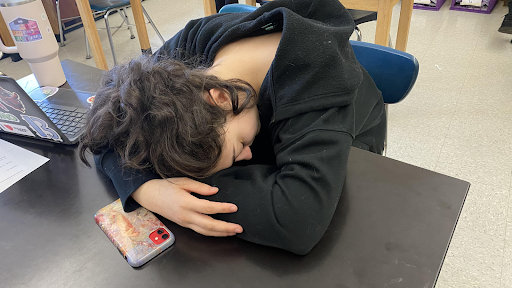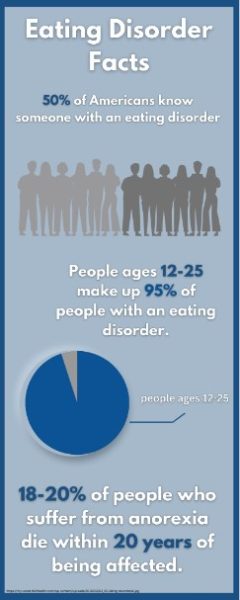
The week of February 25th through March 3rd is recognized as National Eating Disorders Awareness Week.
According to the National Eating Disorders Association, 28.8 million Americans will suffer from some type of eating disorder in their lifetime. Many of those people will suffer in silence. This heightens the importance of having a week to bring attention to these mental illnesses.
South Windsor High School psychologist, Bonnie Jones, shared that due to the stigmas around eating disorders, many kids hide, or they do not realize that these disorders are present in their life because it is not out in the open.
“Kids who might identify and realize they are not alone in this situation, and they can get help, and give them information about how to get help,” Jones said explaining why it is important to highlight these mental disorders.
Eating disorders can affect a student’s academic performance alongside their physical health.
Psychology teacher, Mrs. Erin Simcik, shared that without consuming adequate amounts of food, a person’s body can not adequately function because it restricts the necessary nutrients that a student’s mind needs to perform well academically.
“The mind will not be able to perform properly while being affected by an eating disorder. Most of the time students’ minds will be more focused on the food that they are going to eat or not,” Simick stated.
Simcik identified that because of this, you will not get the best possible school experience and “it is going to change everything fundamentally.”

Oftentimes, having an eating disorder correlates with low self esteem and a poor body image.
Jones touched on the fact that these disorders can cause social anxiety and other mental issues. Eating disorders not only affect the way students learn, but also the accessibility to education they have.
“It can create anxiety situations where people don’t want to be around other people,” Jones said.
Being a bystander to someone with an eating disorder can come with a lot of unanswered questions. Most of the time those with eating disorders do not want to bring attention to it. Finding ways to help can be difficult.
On one hand, talking about eating disorders makes some people’s illness worse. However, discussing the topic can normalize these disorders and even create groups based solely off of having an eating disorder.
Simcik also shared that letting a peer know that you are there for them and reassuring them can be the best way to handle a situation like this occurring.
“Food or body image is not why I’m friends with you; I’m friends with you for different reasons,” Simcik offered as a way to engage with someone close to you who might be struggling.
Creating a community where eating disorders are recognized is the best way to build support around those suffering. Having accessible resources can help bring attention to the signs of eating disorders. If you or someone you know could be dealing with an eating disorder do not hesitate to reach out to trusted adults and know you are not alone.









